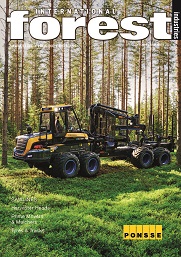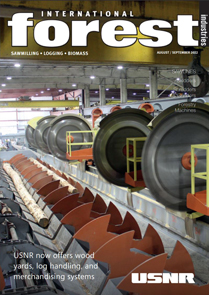EDITOR’S COMMENT Issue 89
Look after yourselves
As we put the finishing touches on our October-November edition, the Autumn, or Fall, has well and truly closed in around our Northern Hemisphere readers. That means a few things.
The poets will draw inspiration from morning frosts and golden leaves. For those of us lucky enough to work in the forests of the world, we’ll also enjoy the change of season, but it is too easy to push aside some of the challenges this Autumn may bring.
This is no ordinary shift into winter. The trauma for many wrought by the COVID -19 pandemic has changed the landscape. Perhaps not the physical landscape – the stands are still there, and the sawmills continue to hum – but the mood is likely to have changed. The world, including those who rely on the forests, has been scarred.
As we deferred to advice almost solely from tropical disease experts, and politicians counted their success by the most confronting of immediate metrics – deaths – communities locked down for months on end. Some asked about the health challenges we were deferring by implementing this policy and the price we would be asked to pay in the future. They were reminded of the more pressing priority.
The fallout from neglecting treatment of other medical conditions could play out over the next couple of decades, but one immediate consequence from both the pandemic and our means of fighting it has been the impact on mental health.
Research published in The Lancet Psychiatry in 2021 was already showing up mental health problems for a third of those infected by COVID. This is before we consider the effects from lockdowns, loss of livelihoods and loss of loved ones.
More recent research from mental health charity Mind found another third of people were reporting their mental health was “much worse” post-pandemic.
As we welcome the opportunity to put COVID behind us, we mustn’t ignore its legacy. Those already suffering from depression, and the increased proportion of society now vulnerable to more severe mental health conditions need support. And they need to know they can ask for that help.
Waking up to the dark and watching the nights close in early is already a tough time to manage your mood. My worry is the nature of forestry work combined with post-COVID challenges has made this Autumn a particularly dangerous period in our industry.
The forestry sector, though increasingly diverse, is still dominated by men. Though in many places the percentage of women in forestry is as high as 40%, this includes administrative and ownership positions. Though statistics range, we would speculate the percentage of women actually working in the forests is around 20%.
The reason this is important is because research shows women are far better at managing mental health and seeking assistance when needed.
The picture all this paints is a worker sitting alone in the cab of a forestry rig for long periods in an environment growing increasingly dark. That worker is likely to be more vulnerable to mental illness than pre[1]pandemic and in most cases will be reluctant to ask for help if struggling.
We’re lucky in the sense our industry generally inspires comradery. There are also more mental health support networks than ever before, and contractors and employers are more aware and supportive than was once the case.
But it feels like this is a very real challenge of which we should all be aware. We should be encouraged to ask for help when needed, and be on the look out for signs a colleague may be battling.
Let’s look after each other.
Enjoy
Chris Cann







